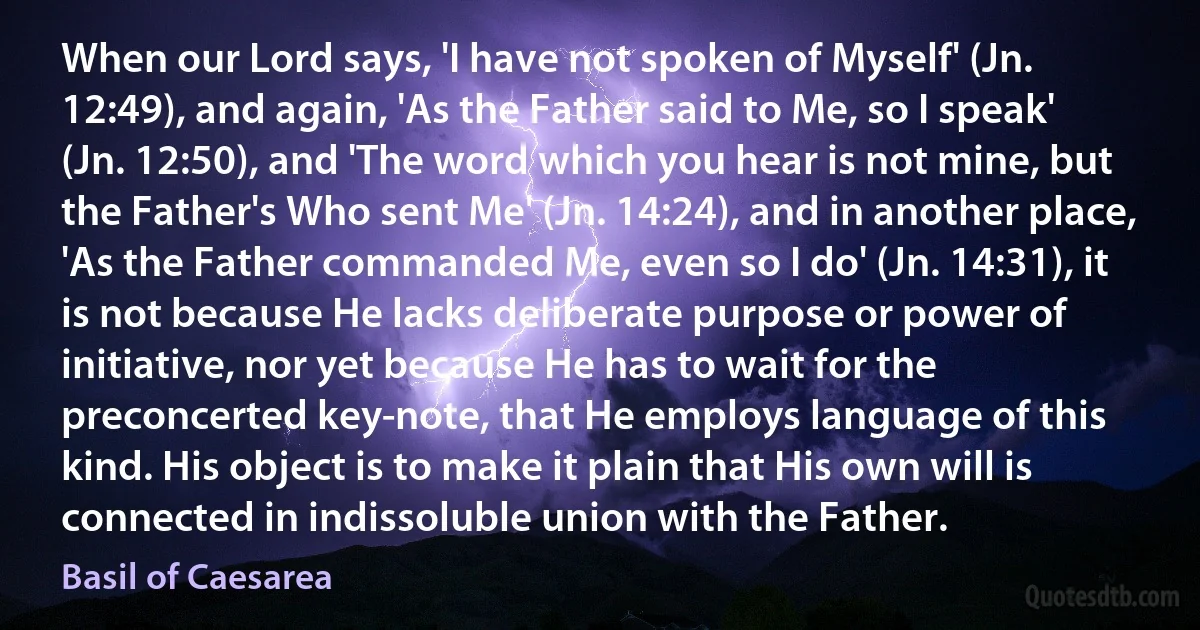
When our Lord says, 'I have not spoken of Myself' (Jn. 12:49), and again, 'As the Father said to Me, so I speak' (Jn. 12:50), and 'The word which you hear is not mine, but the Father's Who sent Me' (Jn. 14:24), and in another place, 'As the Father commanded Me, even so I do' (Jn. 14:31), it is not because He lacks deliberate purpose or power of initiative, nor yet because He has to wait for the preconcerted key-note, that He employs language of this kind. His object is to make it plain that His own will is connected in indissoluble union with the Father.
Basil of CaesareaRelated topics
father initiative kind language lord mine nor place plain power purpose say sent speak wait word yetRelated quotes
We must, with God's help, eradicate the deadly poison of the demon of anger from the depths of our souls. So long as he dwells in our hearts and blinds the eyes of the heart with his somber disorders, we can neither discriminate what is for our good, nor achieve spiritual knowledge, nor fulfill our good intentions, nor participate in true life; and our intellect will remain impervious to the contemplation of the true, divine light; for it is written, 'Man's anger does not bring about the righteousness of God' (Jms. 1:20).

John Cassian
God always was, and always is, and always will be. Or rather, God always Is. For Was and Will be are fragments of our time, and of changeable nature, but He is Eternal Being. And this is the Name that He gives to Himself when giving the Oracle to Moses in the Mount. For in Himself He sums up and contains all Being, having neither beginning in the past nor end in the future; like some great Sea of Being, limitless and unbounded, transcending all conception of time and nature, only adumbrated [intimated] by the mind, and that very dimly and scantily.

Gregory of Nazianzus
Every Christian should find for himself the imperative and incentive to become holy. If you live without struggle and without hope of becoming holy, then you are Christians only in name and not in essence. But without holiness, no one shall see the Lord, that is to say they will not attain eternal blessedness. It is a trustworthy saying that Jesus Christ came into the world to save sinners (I Tim. 1:15). But we deceive ourselves if we think that we are saved while remaining sinners. Christ saves those sinners by giving them the means to become saints.

Philaret Drozdov
But to proceed; as in order and place, so also in matter of her Creation, Woman far excells Man. things receive their value from the matter they are made of, and the excellent skill of their maker: Pots of common clay must not contend with China-dishes, nor pewter utensils vye dignity with those of silver.... Woman was not composed of any inanimate or vile dirt, but of a more refined and purified substance, enlivened and actuated by a Rational Soul, whose operations speak it a beam, or bright ray of Divinity.

Heinrich Cornelius Agrippa
I take it for granted, when I am invited to lecture anywhere, - for I have had a little experience in that business, - that there is a desire to hear what I think on some subject, though I may be the greatest fool in the country, - and not that I should say pleasant things merely, or such as the audience will assent to; and I resolve, accordingly, that I will give them a strong dose of myself. They have sent for me, and engaged to pay for me, and I am determined that they shall have me, though I bore them beyond all precedent.

Henry David Thoreau
